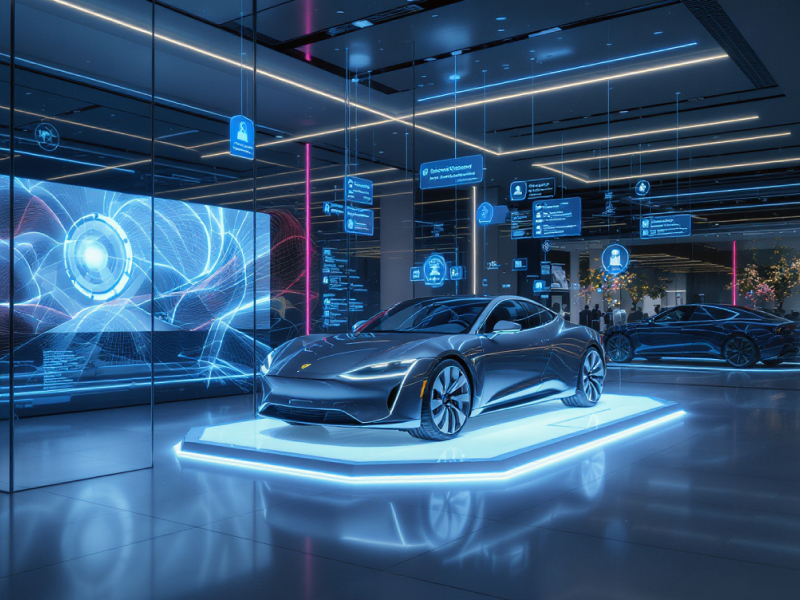What if your next car found you - just like your next Netflix binge? As mobility expectations shift, the future of automotive sales lies in inspiration from the digital giants who’ve already mastered convenience, personalisation, and loyalty.
TL;DR – Key Takeaways
- Consumers now demand seamless, digital-first experiences even when buying cars.
- Netflix’s AI-powered recommendations and subscription model offer a blueprint for personalising car sales and introducing flexible vehicle access.
- Klarna shows how simplifying the payment journey boosts conversions, automotive brands can replicate this with digital financing tools.
- Tesla’s direct-to-consumer model bypasses traditional dealerships, offering speed, transparency, and greater brand control.
- Digital tools like virtual showrooms, AI chatbots, and CRM systems create a smoother, more immersive customer journey.
- Data analytics helps dealerships predict behaviour, personalise marketing, and optimise inventory management
- Automotive brands that embrace these digital-first strategies are best positioned to thrive in a rapidly evolving landscape.
The automotive industry stands on the brink of a revolution. Consumer expectations are evolving faster than ever, with people increasingly demanding convenience, personalisation, and seamless, digital-first experiences in every aspect of their lives - including how they buy and interact with vehicles. Traditional car sales methods, with long in-person negotiations and complex processes, simply aren’t cutting it anymore in this dynamic landscape.
The good news? The automotive industry doesn’t have to reinvent the wheel to adapt. Inspiration is closer than you might think. By examining the strategies of industry leaders like Netflix, Klarna, and Tesla, automotive businesses can reimagine the way vehicles are sold, marketed, and experienced. Netflix has set the standard for intuitive, personalised user experiences, while Klarna’s innovative payment solutions make purchasing easy and flexible. Tesla, of course, has revolutionised direct-to-consumer sales, cutting out the middleman and delivering a streamlined, digital-first buying process.
In this article, we’ll dive into how strategies from these trailblazers can be adapted to the automotive world. From simplifying the buying journey to crafting unique, customer-centric experiences, these lessons could redefine how vehicles are sold and pave the way for the future of mobility sales.
The Netflix Model: Personalisation and Subscription-Based Access
How does Netflix keep 238 million subscribers worldwide glued to their screens for an average of 3.2 hours a day? The answer lies in its mastery of personalisation and seamless user experience. With over 80% of its viewing activity driven by AI-powered recommendations, Netflix has become a global leader in delivering tailored customer experiences. Its algorithm analyses user data to predict preferences, serving up content that feels curated just for you. Combined with its subscription-based access, Netflix has set a gold standard for engagement and loyalty.
What can the automotive industry learn?
- Personalised Vehicle Recommendations:
Just as Netflix curates content based on individual preferences, automotive retailers can harness AI to analyse buyer data, such as driving habits, budget, and style preferences, to recommend vehicles that perfectly align with each customer’s needs. Imagine an online showroom that feels like it was designed just for you, showcasing cars that fit your lifestyle, whether you're a city commuter or an adventure seeker. Such a personalised experience can simplify decision-making while creating a deeper connection between brands and customers.
- Subscription-Based Car Access:
The rise of mobility trends shows that consumers are increasingly favouring flexibility and access over traditional ownership. By offering subscription models, automakers can cater to this shift, allowing customers to access vehicles without the long-term commitment of buying. Picture a service where you can swap cars monthly to suit your changing needs: SUV for a road trip, a compact car for city driving, or even an electric vehicle for eco-conscious adventures. Just as Netflix lets you switch between genres with ease, car subscriptions could offer customers the flexibility to adapt their vehicles to their lifestyle.
This model not only creates a smooth and engaging experience for customers but also helps improve retention rates by fostering long-term loyalty. By borrowing ideas from Netflix's success, the automotive industry has an opportunity to redefine how consumers interact with mobility, delivering convenience, customisation, and satisfaction like never before.
Klarna's Approach: Simplifying the Purchase Process
If you’ve shopped online and used Klarna, you’ll understand why it’s transforming e-commerce. By offering flexible payment options like pay-in-3 or pay-later plans and providing a seamless checkout experience, Klarna has become a leader in simplifying online transactions. With 11 million active customers in the UK alone and partnerships with over 675,000 merchants worldwide, its impact is undeniable. Retailers implementing Klarna’s solution have reported a 30% boost in conversions, proving that giving customers greater control over their purchases pays off in significant ways.
How does this translate to car sales?
The car-buying process is infamous for its complexity and overwhelm. Lengthy negotiations, confusing financing options, and a lack of transparency often deter potential buyers. Automotive retailers can learn from Klarna’s strategy by breaking down these barriers with flexible payment terms or buy-now-pay-later options. Incorporating user-friendly online tools such as financing calculators, trade-in value estimators, or even digital payment plans can bring Klarna’s simplicity to car sales.
By empowering customers with clear, transparent choices and a modernized buying experience, automotive businesses can build trust, increase customer satisfaction, and reduce drop-offs during the buying journey. Streamlining the process doesn’t just simplify sales; it transforms browsers into buyers and ensures that customers feel confident in their decisions, ultimately driving long-term loyalty and growth.
Tesla's Direct-to-Consumer Strategy: Redefining Dealerships
Tesla has revolutionised the automotive sales industry by completely bypassing the traditional dealership model. Instead of relying on third-party retailers, Tesla allows customers to buy directly from the company through its seamless online platform, where buyers can customize their vehicles according to personal preferences. This streamlined process eliminates the need for haggling or dealing with middlemen, creating a more straightforward and transparent buying experience. The results speak for themselves. Tesla sold an impressive 1.79 million vehicles in 2024, with the Model Y claiming the title of the best-selling car globally that year, marking a significant milestone for the electric vehicle market.
Challenges and opportunities for traditional dealerships
Tesla’s direct-to-consumer approach has ushered in a new era of automotive retail, giving the company complete control over pricing, inventory management, and customer experience. This approach also allows Tesla to build a direct relationship with its customers, fostering loyalty and trust. Additionally, the hassle-free purchasing process appeals strongly to modern consumers, who increasingly value convenience, transparency, and speed.
For traditional car retailers, this shift poses significant challenges but also opens new opportunities. Dealerships can adapt by exploring hybrid models, blending digital showrooms with engaging in-store experiences for customers who still prefer a physical touchpoint. For example, offering test drives, personalised consultations, or vehicle maintenance services on-site can enhance the customer journey while leveraging the efficiency of online platforms for purchases and browsing.
While traditional dealerships won’t disappear overnight, it’s clear that supplementing them with robust and user-friendly online solutions is crucial to staying competitive. As consumer preferences evolve, the ability to integrate digital innovation while maintaining the personal connection of in-store experiences will be key to surviving and thriving in this changing landscape.
Integrating Digital Tools to Enhance Customer Experience
Today’s car buyers expect the same seamless, personalised experience they find while shopping online or using booking platforms. The days of relying solely on in-person dealership visits are fading. Instead, customers look for convenience, transparency, and efficiency when making purchase decisions - qualities that digital tools can deliver.
Adopting digital tools like virtual showrooms, AI-driven customer service, and advanced CRM systems isn’t just a nice-to-have anymore; it’s essential for staying competitive in a rapidly evolving industry. Future-forward automotive brands that offer immersive, tech-driven experiences will not only capture their customers’ attention but also build stronger trust and loyalty.
Real innovation in action
- Virtual Showrooms: Platforms like Audi's immersive 3D configurators allow consumers to customise, visualise, and explore every detail of their cars without stepping foot in a dealership. Customers can select features, compare models, and see their dream car come to life in high definition, giving them a sense of control and ownership from the very beginning.
- AI Assistance: Research shows that 68% of dealerships using AI report improved operations and customer service (source). AI-powered chatbots and virtual assistants streamline communication by answering customer queries instantly whether it’s about financing options, trade-in values, or vehicle availability. These tools eliminate delays, freeing up staff to focus on high-impact interactions and creating a smoother customer journey overall.
- Data-Driven Insights: Advanced CRM platforms allow dealerships to track customer preferences, predict buying behaviours, and personalise follow-ups, ensuring that every touchpoint feels relevant and timely. This level of precision helps build meaningful relationships with customers that go beyond just the initial transaction.
By investing in technologies that reduce friction and put the customer in control, businesses can not only meet but exceed modern expectations. The result? Higher satisfaction, improved conversion rates, and a strong reputation for innovation in an increasingly digital sales landscape.
Data-Driven Decision Making in Automotive Sales
Data is the new fuel driving growth in the automotive sector. The global revenue from online vehicle retail is predicted to grow from $120 billion in 2018 to $605 billion by 2025, underlining the shift towards digital platforms.
Why data matters for automotive retailers
By leveraging data analytics, brands can predict customer preferences, spot industry trends, and fine-tune marketing strategies. For instance, 71% of consumers now expect personalised marketing, meaning generic ads won't cut it anymore. Companies like General Motors already use predictive analytics to identify when a vehicle lease is about to expire, allowing them to proactively reach out to customers.
With the right data, vehicle inventory can also be better managed, reducing waste and enhancing profitability.
Shaping the Future of Mobility
Learning from digital-first leaders like Netflix, Klarna, and Tesla provides a clear roadmap for transforming the future of car sales. These companies have set the standard for customer-centric innovation, and automotive brands can follow suit by focusing on the following priorities to thrive in an increasingly competitive market:
- Leverage AI to deliver personalised recommendations, subscription models, and tailored customer experiences that build loyalty.
- Simplify the car-buying process with seamless financing and payment tools that make transactions faster and more intuitive.
- Transition to direct-to-consumer sales or hybrid models to offer customers greater flexibility and control over their purchases.
- Invest in advanced digital tools like virtual showrooms, augmented reality, and AI-driven service to create frictionless, engaging customer experiences.
- Use data analytics to drive smarter decisions, from crafting targeted marketing strategies to optimising inventory and production management.
The shift toward a digitally optimised automotive industry is already underway, and the brands that embrace these changes quickly and effectively will secure their place at the forefront of the market.
Explore Our Latest Insights
Discover trends and innovations in the automotive sector.








